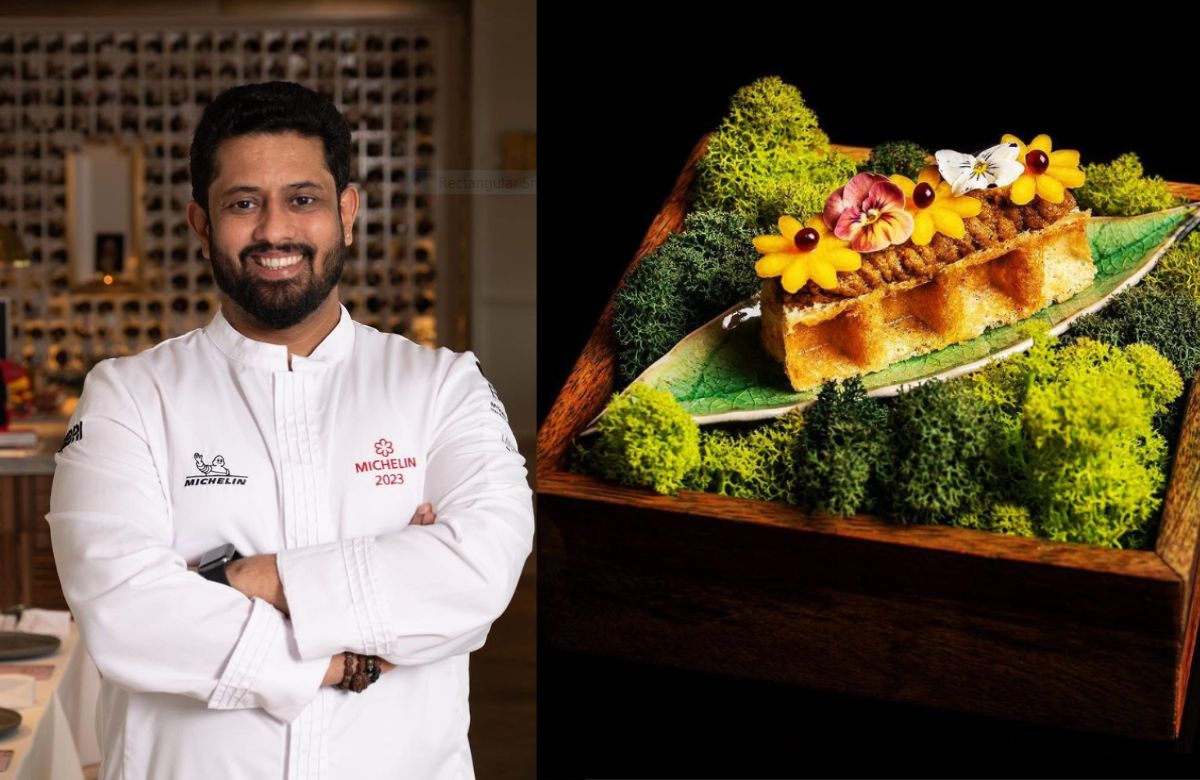If you go looking at the guide of Michelin-starred establishments, chances are obvious that they are synonymous with haute cuisine, often featuring elaborate meat and seafood dishes. And then recently, Dubai’s Avatara created history by being the world’s first solely vegetarian restaurant to find its place in the Michelin Guide. “This is an honour that fills me with immense pride and a sense of accomplishment. It’s a testament to our dedication to redefining vegetarian cuisine and pushing the boundaries of creativity,” Avatara’s Chef Rahul Rana expresses.
Exceptional Dining Is Possible With Vegetarian Food
The Michelin Guide’s embrace of vegetarian cuisine also reflects the global diversity of food traditions. “Without relying on meat-based ingredients, we are challenged to transform humble vegetables into culinary masterpieces. It’s a chance to experiment with textures, flavours, and techniques, resulting in dishes that surprise and captivate the senses,” he explains. Well yes, the perception of vegetarian cuisine has evolved: from a side dish to a culinary art form.
It’s no joke to establish and make a mark with vegetarian dishes in Dubai’s bustling culinary scene. It requires techniques and innovations to mainstream the appeal of vegetarian dining. “Our focus on unconventional ingredients, thoughtful presentation, and culinary storytelling sets us apart. We continuously engage with our guests, gather feedback, and refine our offerings,” Chef Rahul Rana answers.
Nestled within the gleaming cityscape of Dubai, Avatara isn’t just a restaurant now. Its menu is a meticulously curated masterpiece, a culinary canvas painted with ingredients that need focus.
Focus On Lesser-Known Ingredients
If you look at Avatara’s menu, the dishes have a distinct identity. Ingredients like bitter gourd, turnip, jackfruit and more have a culinary narrative. Moreover, they have a boundless possibility to be crafted into unique dishes. “The essence of the food at Avatara lies in using unconventional and underappreciated vegetables. We create dishes inspired by humble seasonal ingredients, that are pure, clean, natural, and energy-containing,” he says.
Chef Rahul goes on to explain how dishes like Karuvelvilas, a ghee roast karela with mango sambhar gelato and crispiness of dosai make a fantastic canvas for innovative dishes. Others include Panasa ( jackfruit momo with sea buckthorn thukpa, black rice crisp), Grinjanah (a turnip steak with berry pulao, chilli curry) and Alabu (a bottle-gourd mix with papadum waffle and pickled pumpkin). ” Lesser-known vegetarian ingredients with their versatility allow to create of a variety of textures and flavours,” he explains.
Moreover, Chef Rana recently did a showcase of a 16-course meal at Pune’s Conrad Hotel, thanks to Conosh, a Bengaluru-based platform. And by now, I was already intrigued to know more about how certain ingredients can take dishes to new heights, the vegetarian renaissance and more:
1. How do you perceive the increasing recognition of vegetarian cuisine in Michelin ratings?
The increasing recognition of vegetarian cuisine in Michelin ratings reflects a significant shift in the culinary landscape. Diners are becoming more conscious of their dietary choices. They are seeking unique, flavourful, and sustainable options. This trend underscores the changing preferences of diners and future chefs who are valuing plant-based offerings for their creativity, health benefits, and culinary artistry.
Also Read: World’s Only Veg Michelin-Starred Restaurant From Dubai Is Coming To India; Details Inside
2. How does Avatara incorporate Dubai’s cultural diversity into its menu?
Dubai’s cultural diversity is indeed a unique canvas to work with. At Avatara, we draw inspiration from a variety of culinary traditions while staying true to our Indian roots. By infusing globally inspired flavours with our distinctive approach to
vegetarian cuisine, we create a harmonious blend that resonates with our cosmopolitan audience, offering them a memorable and unique dining experience.
3. How have you observed this change in vegetarianism impacting the way chefs approach their menus and creative process?
Chefs are embracing this shift by treating vegetarian ingredients with the same level of creativity and attention as they do
with traditional dishes. Coming back to India with Conosh has reintroduced me to the plethora of vegetarian options and cooking techniques that Indians use on a daily basis. As a large portion of the population prefers vegetarian fare, the
vegetables cease to be after-thoughts and take centre stage, making it exciting for chefs like me. The creative process now involves exploring the potential of vegetables, combining diverse textures, and drawing on global influences to create dishes that stand on their own merits.
4. Winning a Michelin star involves not only exceptional flavours but also exceptional storytelling…
Crafting narratives around vegetarian dishes is an integral part of the dining experience. We focus on connecting the ingredients to their origins, highlighting the techniques used, and weaving a story that enhances the overall enjoyment of
the dish. This storytelling adds depth and a personal touch that resonates with diners and makes the experience more memorable.
5. Could you share some insights into the creative process behind developing dishes for the Avatara menu?
The creative process behind Avatara’s dishes is a fusion of inspiration, experimentation, and innovation. It starts with identifying seasonal and locally sourced ingredients, conceptualizing innovative combinations, and refining techniques to bring out the best flavours and textures. Each dish is meticulously crafted to evoke emotions and tell a story through taste.
6. Finally, what’s on the horizon for Avatara? Are there any upcoming menu changes, events, or projects you’re particularly excited about?
I’m excited to share that our journey continues to evolve, and we have some exciting plans on the horizon. One of the most significant steps forward is opening our second Avatara restaurant, this time in Mumbai, later this year. We’re thrilled to bring our unique approach to vegetarian fine dining to a new audience and continue to challenge perceptions about vegetarian cuisine.
It is clear that this trend is not a passing fad but a lasting transformation that will shape the future of dining around the world. The ascent of vegetarian cuisine has found its rightful place among the stars. Well, thanks to chefs like Rahul Rana!
Cover image credits: Instagram/Rahul Rana; Instagram/Avatara

